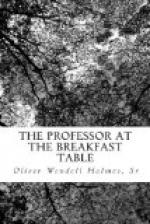No human being can rest for any time in a state of equilibrium, where the desire to live and that to depart just balance each other. If one has a house, which he has lived and always means to live in, he pleases himself with the thought of all the conveniences it offers him, and thinks little of its wants and imperfections. But once having made up his mind to move to a better, every incommodity starts out upon him, until the very ground-plan of it seems to have changed in his mind, and his thoughts and affections, each one of them packing up its little bundle of circumstances, have quitted their several chambers and nooks and migrated to the new home, long before its apartments are ready to receive their coming tenant. It is so with the body. Most persons have died before they expire,—died to all earthly longings, so that the last breath is only, as it were, the locking of the door of the already deserted mansion. The fact of the tranquillity with which the great majority of dying persons await this locking of those gates of life through which its airy angels have been going and coming, from the moment of the first cry, is familiar to those who have been often called upon to witness the last period of life. Almost always there is a preparation made by Nature for unearthing a soul, just as on the smaller scale there is for the removal of a milktooth. The roots which hold human life to earth are absorbed before it is lifted from its place. Some of the dying are weary and want rest, the idea of which is almost inseparable in the universal mind from death. Some are in pain, and want to be rid of it, even though the anodyne be dropped, as in the legend, from the sword of the Death-Angel. Some are stupid, mercifully narcotized that they may go to sleep without long tossing about. And some are strong in faith and hope, so that, as they draw near the next world, they would fair hurry toward it, as the caravan moves faster over the sands when the foremost travellers send word along the file that water is in sight. Though each little party that follows in a foot-track of its own will have it that the water to which others think they are hastening is a mirage, not the less has it been true in all ages and for human beings of every creed which recognized a future, that those who have fallen worn out by their march through the Desert have dreamed at least of a River of Life, and thought they heard its murmurs as they lay dying.
The change from the clinging to the present to the welcoming of the future comes very soon, for the most part, after all hope of life is extinguished, provided this be left in good degree to Nature, and not insolently and cruelly forced upon those who are attacked by illness, on the strength of that odious foreknowledge often imparted by science, before the white fruit whose core is ashes, and which we call death, has set beneath the pallid and drooping flower of sickness. There is a singular sagacity very often shown in a patient’s estimate of his own vital force. His physician knows the state of his material frame well enough, perhaps,—that this or that organ is more or less impaired or disintegrated; but the patient has a sense that he can hold out so much longer,—sometimes that he must and will live for a while, though by the logic of disease he ought to die without any delay.




